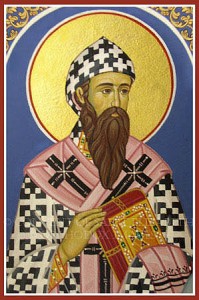While some saints are revered for their gentle natures and charity and sweetness toward others, there are some whom God has required to be in the forefront of battle with the enemy. These are the saints who have had to defend the Orthodox faith against heresy, perhaps chosen for their forceful personalities and uncompromising attitudes. Among these saints we give honor to St. Nicholas, St. Athanasius, and St. Cyril of Alexandria, whose day we celebrate on February 9.
Born in 376, Cyril was the nephew of Theophilus, the Patriarch of Alexandria, whom he succeeded in 412. He was immediately faced with the Novatian controversy (surrounding the refusal to accept back into the church those who had apostatized during persecutions) and other controversies (Arianism, Neo-Platonism, etc.) soon followed. St. Cyril made many enemies in the process, but he was untiring in his fight against these threats to the Catholic faith.
According to biographer R. Payne Smith in the introduction to his translation of St. Cyril’s Commentary on the Gospel of Saint Luke:
“Cyril is not an exception for his time; for his kind of pastor-theologian-administrator is typical of the men who piloted the ark of the Church in this Golden age of the Fathers. Emerging from a period of persecution and illicit existence into the exhilaration of Constantinian freedom, the Church found herself fending off internal foes who, abusing this freedom, and misunderstanding the Scriptures and the Tradition whose written spirit they are, sowed dissension and confusion more destructive than the pagan persecutions which they succeeded. Against these distortions of Revelation, giants such as St. Cyril mobilized their vast spiritual strength and broad erudition. He is one of that phalanx of bishops who, because of their personal living of the faith, were the bulwarks of its defense. Being a successor to the Apostles, he did not hesitate to draw upon the license implicit in this lineage to speak ‘as one having authority’ in the name of the Lord.”
The greatest question facing the Church in Cyril’s time had to do with the definition of the Person of Christ. Nestorius taught that Christ’s two natures were actually two persons – one human, one divine. This unorthodox belief resulted in the declaration that St. Mary was only the mother of Jesus, the man and not Theotokos, “Mother of God”. Patriarch Cyril fought vigorously against this view, and presided over the Council of Ephesus (the third Ecumenical Council) which rejected Nestorius’ teachings. Since that time, the Church has honored Mary as the Mother of God.
St. Cyril was a prolific writer, not only of works against heresy, but also commentaries on Holy Scripture, sermons, and letters. Even during his lifetime, some of these works were translated into Syriac, Armenian, Ethiopian, and Arabic for the benefit of the churches in many lands.
As R. Payne Smith said,
“St. Cyril reposed on 27 June 444 and he is remembered and honored not only among the Orthodox but throughout Christendom with accolades that few others have received: Seal of the Fathers, Doctor of the Church, Defender of the True Faith and Apostolic Man. He was zealous for the apostolic faith, a lover of Scripture and a loving shepherd whose contribution to Christian thought and spirituality has not waned.”
O God, who didst strengthen thy blessed Confessor and Bishop Saint Cyril, invincibly to maintain the divine motherhood of the blessed Virgin Mary: vouchsafe that at his intercession we, believing her to be indeed the Mother of God; may as her children rejoice in her protection. Through the same Jesus Christ our Lord, who liveth and reigneth with thee and the Holy Spirit, world without end. Amen.
